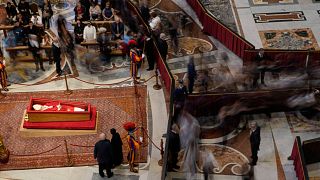Black Culture
Artist and activist Patrisse Cullors is leaning into her art these days, gaining sustenance and perspective from it.
She speaks of it as not just a vocation, but a means of salvation: At one point, the impact of accusations of financial mismanagement at Black Lives Matter — from which she resigned in 2021 — wounded her so deeply, her mental health was imperiled and she felt her very life was in danger, she says. What has ultimately saved her more than once, she feels, is her art.
"So much of the last few years has been, to be really honest, just deep depression and anxiety and a lot of trauma, a lot of freezing, a lot of fear," she said. "And I just kept going back to my art practice. I kept going back to art, and every time I would go back to art, I would feel like myself again. I would feel more connected again, and I would feel more hopeful.”
Cullors says that her art was deeply integral to her healing and that her art practice saved her life over and over again. The artist is best known for her role as co-founder of the Black Lives Matter organization.
Her recent show at the Broad, her second at the contemporary art museum, was part of an evening focusing on the effects of colonialism on literature, language, and music of people of color. It reflected her experience with what she describes as “the impact of right-wing media on Black people and Black leaders through targeted misinformation and disinformation campaigns,” and focused on healing. The performance, titled “Don’t Disappear Us/Keep us Leaping/Low Riders and Bonnets that Heal,” centered on a few seemingly mundane artifacts: the bonnet, which she says has a protective symbolism for Black women; a partially built lowrider; and a trampoline. The piece included a live singer and a recording of Cullors chanting in her daily Ifa religious practice.
Her religious practice is the theme of her current gallery show in Chinatown, “Freedom Portals,” a collaboration with fellow LA-based artist noé olivas — whom she met during graduate school art studies at the University of Southern California — that has been extended to April 15. Highlighting Ifa, it comprises 12 tapestries, illustrations of “Odù,” or oral literary books containing poetic teachings. Eventually, she wants to create 256 such tapestries, accounting for all Odù poetic tutorials.
“This work is really an ode to the Ifa tradition and to the ancient symbology," Cullors says. The objects are meant to honor tradition but also to be viewed “in response to the contemporary moment and its accelerated pace and attendant exhaustion,” the gallery materials say, referring to community building and self-care.
And self-care is something Cullors is focusing on these days, especially through her art.
“I have spent the better half of my own life fighting on behalf of others,” she says. “But in the last couple of years it has taken a lot to figure out how to fight for myself, and to fight for my mental health, spiritual health and emotional health."
“These artworks are a really deeply personal call to fight for myself, especially as a Black woman,” she adds. "Because many people don’t fight for us.”











01:55
Top scoring samba schools return to Rio's Sambadrome for champion's parade
Go to video
Honoring black heritage: Shuck One's upcoming exhibit at Pompidou Center
01:00
Satellite Art Show, an unusual exhibition
02:19
Festival season kicks off in India, with colourful celebrations underway
02:20
Love as a choice rooted in mutual respect in new US drama 'She Taught Love'
01:23
North America owes its wealth to brutality of slavery: Canadian expert